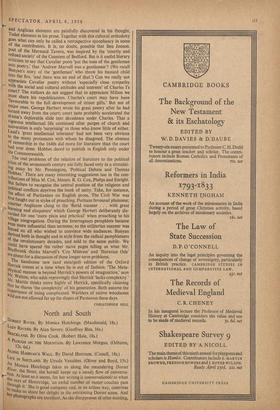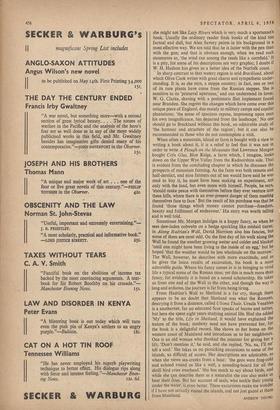North and South
As Monica Hutchings takes us along the meandering Dorset .7iver. the Stour, she herself keeps up a steady flow of conversa- on. At least so it seems, for her writing is conversational; as when the says of Henstridgc, 'an awful number of motor-coaches pass through it.' She is good company and, in an artless way, contrives to make us share her delight in the entrancing Dorset scene. And her photographs are excellent. As she disapproves of otter-hunting,
she might not like Lazy Rivers which is very much a sportsman's book. Usually the ordinary reader finds books of the kind too factual and dull, but Alan Savory paints in his background in a most effective way. We are told that he is lazier with the pen than with the gun; and that is obvious enough, when we read such statements as, 'the wind ran among the reeds like a cornfield.' It is a pity, for some of his descriptions are very graphic; I doubt if W. H. Hudson has given us a better idea of the Norfolk coast.
In sharp contrast to that watery region is arid Breckland, about which Olive Cook writes with great charm and sympathetic under- standing. It is, as she says, a steppe country; in fact, one or two of its rare plants have come from the Russian steppes. She is sensitive to its 'primeval apartness,' and can understand its lover, W. G. Clarke, shaving with a prehistoric flint implement found near Brandon. She regrets the changes which have come over this unique piece of England, due mainly to military camps and conifer plantations; 'the sense of spacious repose, impressing upon man his own insignificance, has departed from the landscape.' No one should go to Breckland without this book, an admirable study of `the humour and structure of the region'; but it can also be recommended to those who do not contemplate a visit.
When often a mountain, island or farm is bought with a view to writing a book about it, it is a relief to feel that it was not in order to write A Plough on the Mountain that Lawrence Morgan bought Cefn Glas, Blue Ridge, a farm which, I imagine, looks down on the Upper Wye Valley from the Radnorshire side. That is evident from the concluding chapter in which he discusses the prospects of mountain farming. As the farm was both remote and half-derelict, and nine farmers out of ten would have said he was mad to buy it, he must have been making an experiment, not only with the land, but even more with himself. People, he says, 'should make peace with themselves before they ever venture into these hills, where there is an ever-present danger of them meeting themselves face to face.' But the result of his purchase was that he found 'those things which money cannot purchase—freedom, beauty and fulfilment of endeavour.' His story was worth telling and is well told.
Sometimes Mr. Morgan indulges in a happy fancy, as when he sees dew-laden cobwebs on a hedge sparkling like mislaid tiaras; in Along Hadrian's Wall, David Harrison also has fancies, but some of them are most odd. On the first day of his walk along the Wall he found the weather growing wetter and colder and blacker `until one might have been living in the inside of an egg,' but he, hoped 'that the weather would be less wholesale on the morrow.' The Wall, however, he describes with more exactitude, and as he gives the latest results of excavation, his book is a most admirable guide. Where his fancy comes in is in bringing to vivid life a typical scene of the Roman time; yet this is much more than fancy, for evidently it is based on a sound scholarship. He takes us from one end of the Wall to the other, and though the way is long and arduous, the journey is far from being tiring.
From Hadrian's Wall to Shetland is a far cry, though
there appears to be no doubt that Shetland was what the Romans, descrying it from a distance, called Ultima Thule. Ursula Venables is a southerner, for no educated Scot speaks of bairns and tatties, but here she spent eight years studying animal life. Had she added 'My' to the title, Life in Shetland, it would have explained the nature of the book; modesty need not have prevented her, for the book is a delightful record. She shows us her home on the western coast of Mainland and introduces us to her neighbours. One is an old woman who thanked the minister for giving her a lift; 'Don't mention it,' he said, and she replied, `Na, na, I'll no tell a soul.' She takes us on picnicking excursions to some of the islands, so difficult of access. Her descriptions are admirable, as when she views sea-creeks from a boat : 'the geos were frog-
cold and echoed round us like a well, a sounding-board for all the shrill bird cries overhead.' She has much to say about birds, and while she can describe them as a naturalist she can also make us hear their cries. But her account of seals, who suckle their young under the water, is even better. These excursions make me wonder if I have not actually visited the islands, and not just gazed at them from Mainland, ANDREW YOUNG

















































 Previous page
Previous page